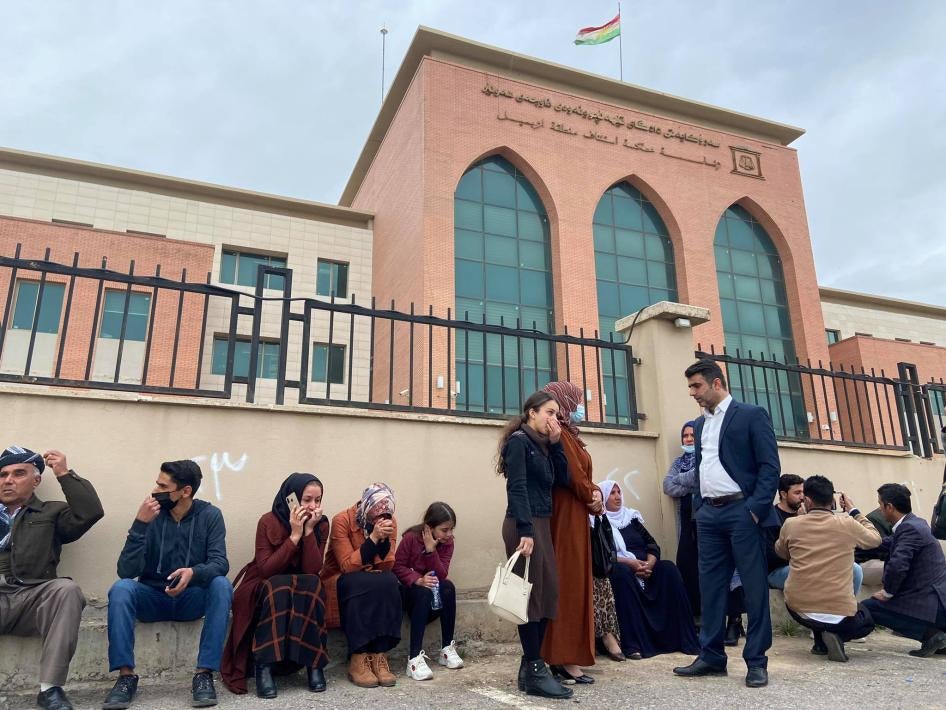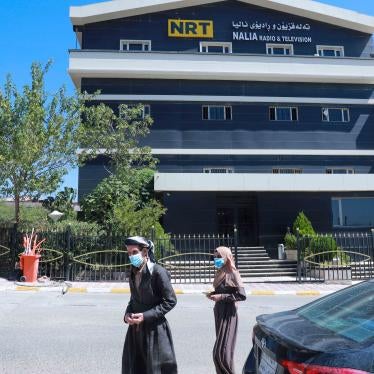(Beirut) – A court in the Kurdistan Region of Iraq sentenced three journalists and two activists to six years in prison on February 16, 2021, in deeply flawed proceedings, Human Rights Watch said today. The authorities continue to hold two other people despite a court ruling that there was insufficient evidence to try them. Human Rights Watch is publishing its research into the trials now because of the likelihood of an imminent appeals decision.
The proceedings in the Erbil Criminal Court were marred by serious violations of fair trial standards as well as high-level political interference. Authorities involved in the appeal should consider these violations when deciding whether to oppose the appeal. Authorities from the Erbil and Dohuk areas of the Kurdistan Region arrested two of the men in August 2020 and the other five in October, reportedly for planning unauthorized demonstrations. From May to October, activists and teachers in the Dohuk area had organized protests calling for payment of government salaries that authorities had delayed.
“Flawed trials in the Kurdistan Region are nothing new,” said Belkis Wille, senior crisis and conflict researcher at Human Rights Watch, “But flaunting the most basic principles of justice to punish people for allegedly planning protests is a new low.”
One lawyer, a relative of one detainee, and another independent source who was present during the proceedings shared detailed information about fair trial concerns. The journalists sentenced are Ayaz Karam Brushki, Kohidar Mohammed Zebari, and Sherwan Ameen Sherwani. The other two, Shivan Saed Omar Brushki and Harwian Issa Ahmed, are activists who frequently criticize government practices and call for reforms.
The five men were sentenced in a joint trial under articles 47, 48, and 49 of the Iraqi Penal Code and article 1 of Law No. 21 of 2003, amending article 156 of the penal code, which criminalizes acts intended to infringe on the security, stability, and sovereignty of government institutions. The convictions have been appealed.
The three sources also said that the government had not provided sufficient evidence to charge the other two men, Badal Barwary, an activist, and Omid Haji, a journalist, and returned the case to the investigative judge. But the authorities have refused to release them while awaiting further evidence from the prosecution.
The sources said that Sherwani, who was arrested on October 7, was held incommunicado for a week. Shivan Brushki’s relative said that after security forces arrested him at his home on October 22, the family tried repeatedly for two months to find out where he was. He finally was allowed to call his wife and reveal that he was held by the Asayish – the Kurdistan Regional Government’s (KRG) security forces – in Erbil. The three sources said that all seven were detained for months without access to their lawyers, including during interrogations and the investigative hearing.
In March, after the Committee to Protect Journalists issued a report raising concerns around the trial of two of the men, Dindar Zebari, the KRG’s coordinator for international advocacy, responded in a March 14 email that he shared with Human Rights Watch that “they [Zebari and Sherwani] had access to their lawyers while awaiting trial.”
However, the three sources denied this claim and said that authorities only allowed the lawyers to speak with them for the first time for a few minutes before the trial sessions on February 15 and 16. They said that the detainees also had limited access to their families, only seeing them once for a few minutes since they were detained. Shivan Brushki’s relative said that his father was allowed to visit him once for about five minutes in January, and Asayish officers were in the room during the meeting.
The lawyer said that he and the other lawyers defending the men tried to obtain access to the case files before the trials began, but that the Asayish, who held the files, refused to hand them over despite letters from the court granting permission. He said that they only found out about the trial dates seven days beforehand. “We had been told the judge was sick and so we should expect postponements but suddenly the trial was announced and none of us were prepared,” the lawyer said. Brushki’s relative said his family was unable to attend the trial because of the short notice.
The relative said that when security forces arrested Brushki, his wife and children saw the security forces beat him. At the trial, Sherwani was unable to stand, seemingly because of an injury, the lawyer said. He told the judge that security forces had threatened him and also threatened to sexually abuse his wife and mother if he didn’t sign a confession, the lawyer said, “The judge didn’t respond to his allegations even though he couldn’t stand,” he said.
The lawyer and the independent source said the judge and prosecutor repeatedly mentioned information from “secret informants” who did not appear in court that the defendants were spies. Since they did not appear in court, there was no opportunity for the defense to cross-examine them. Both sources who were at the trial said that an Asayish officer who was not part of the prosecution team would occasionally stand and raise his hand, after which the judge would allow him to present new evidence that the defense had not previously seen. The judge did not allow the defense to cross-examine him.
All three sources raised concerns about the basis of the charges against the men. For example, the two sources who were in court said that the Asayish member pointed out a photo that Sherwani had posted on social media with a caption saying that flights between Turkey and the Kurdistan region, which had been suspended for some time, had resumed and asserted that this was evidence he was a spy.
All three said that the evidence presented by the prosecution and a representative of Iraqi Kurdistan’s security council during the trial was largely circumstantial and the lawyers were not allowed to review it.
The Kurdistan speaker of parliament raised concerns with the trials on April 16. Asos Hardi, a prominent journalist and media rights activist, said he believed all seven men were only being prosecuted because they had tried to protest against the regional government:
“There is a law guaranteeing the right to demonstrate and if they broke that law, they should be prosecuted under it,” he said. “If instead they violated the press law as journalists, then they should be tried under that law. There is no reason they should be charged with attempting to destabilize the security of the region with the support of foreign parties. The prosecution has not presented any real evidence of that. This trial ultimately proves how low protections of free expression have fallen in the Kurdistan Region.”
All three sources also raised concerns about political interference. Zebari stated in his March email that the court is independent of the government and apolitical and that the KRG had not interfered in any way with the proceedings. However, a week before the trial, KRG Prime Minister Masrour Barzani stated in a news conference that the detainees “are neither activists nor journalists. Some of them were spies, they spied for other countries… Some were saboteurs.” This prejudicial statement issued shortly before the trial is inappropriate high-level political intervention in the cases and violates the presumption of innocence, Human Rights Watch said.
The lawyer said that his team is awaiting the appeals court response to their appeal. Government authorities involved in the appeal should consider these gross fair trial violations when deciding whether to support the lower court decision at the appeals court.
“These recent convictions only further compound the Kurdistan Region's worsening reputation as a place where people can face unfair criminal trials merely for critiquing government policies they object to and expressing concerns about the political elites,” Wille said.
|
News Release
Kurdistan Region of Iraq: Flawed Trial of Journalists, Activists
Appeals Court Should Consider Flagrant Irregularities
Your tax deductible gift can help stop human rights violations and save lives around the world.
Region / Country
Most Viewed
-
November 25, 2019
A Dirty Investment

-
June 3, 2025
“They’re Ruining People’s Lives”

-
January 25, 2024
“We’re Dying Here”

-
February 19, 2018
“All We Want is Equality”

-
December 21, 2023
Meta’s Broken Promises





